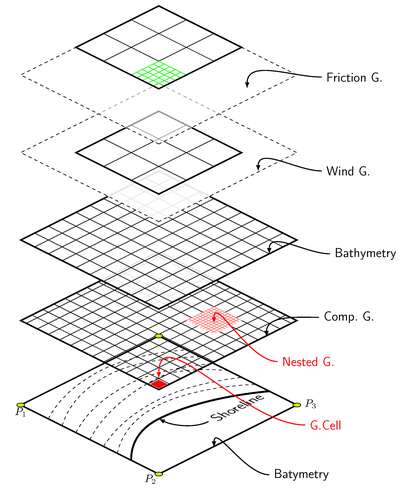SWAN (developed by SWAN group, TU Delft, The Netherlands) is a wave spectral numerical model. For Simlating WAves Nearshore, it is necessary to define spatial grids of physical dominant factors (wind friction, dissipation) as well as define a COMPUTATIONAL grid on which the model performs its (spectral) calculations: budgeting energy spectra over each cell of the (computational) grid. Grids might have different spatial resolution and extension.

Edit and compile if you like:
%Author: Marco Miani
%SWAN (developed by SWAN group, TU Delft, The Netherlands) is a wave spectral numerical model.
%For Simlating WAves Nearshore, it is necessary to define spatial grids of
%physical dominant factors (wind friction, dissipation) as well as define a COMPUTATIONAL
%grid on which the model performs its (spectral) calculations: budgeting energy spectra over
%each cell of the (computational) grid. Grids might have different spatial resolution and extension.
\documentclass[12pt]{article}
\usepackage{tikz}
\usetikzlibrary{positioning}
\begin{document}
\pagestyle{empty}
\begin{tikzpicture}[scale=.9,every node/.style={minimum size=1cm},on grid]
%slanting: production of a set of n 'laminae' to be piled up. N=number of grids.
\begin{scope}[
yshift=-83,every node/.append style={
yslant=0.5,xslant=-1},yslant=0.5,xslant=-1
]
% opacity to prevent graphical interference
\fill[white,fill opacity=0.9] (0,0) rectangle (5,5);
\draw[step=4mm, black] (0,0) grid (5,5); %defining grids
\draw[step=1mm, red!50,thin] (3,1) grid (4,2); %Nested Grid
\draw[black,very thick] (0,0) rectangle (5,5);%marking borders
\fill[red] (0.05,0.05) rectangle (0.35,0.35);
%Idem as above, for the n-th grid:
\end{scope}
\begin{scope}[
yshift=0,every node/.append style={
yslant=0.5,xslant=-1},yslant=0.5,xslant=-1
]
\fill[white,fill opacity=.9] (0,0) rectangle (5,5);
\draw[black,very thick] (0,0) rectangle (5,5);
\draw[step=5mm, black] (0,0) grid (5,5);
\end{scope}
\begin{scope}[
yshift=90,every node/.append style={
yslant=0.5,xslant=-1},yslant=0.5,xslant=-1
]
\fill[white,fill opacity=.9] (0,0) rectangle (5,5);
\draw[step=10mm, black] (1,1) grid (4,4);
\draw[black,very thick] (1,1) rectangle (4,4);
\draw[black,dashed] (0,0) rectangle (5,5);
\end{scope}
\begin{scope}[
yshift=170,every node/.append style={
yslant=0.5,xslant=-1},yslant=0.5,xslant=-1
]
\fill[white,fill opacity=0.6] (0,0) rectangle (5,5);
\draw[step=10mm, black] (2,2) grid (5,5);
\draw[step=2mm, green] (2,2) grid (3,3);
\draw[black,very thick] (2,2) rectangle (5,5);
\draw[black,dashed] (0,0) rectangle (5,5);
\end{scope}
\begin{scope}[
yshift=-170,every node/.append style={
yslant=0.5,xslant=-1},yslant=0.5,xslant=-1
]
%marking border
\draw[black,very thick] (0,0) rectangle (5,5);
%drawing corners (P1,P2, P3): only 3 points needed to define a plane.
\draw [fill=lime](0,0) circle (.1) ;
\draw [fill=lime](0,5) circle (.1);
\draw [fill=lime](5,0) circle (.1);
\draw [fill=lime](5,5) circle (.1);
%drawing bathymetric hypotetic countours on the bottom grid:
\draw [ultra thick](0,1) parabola bend (2,2) (5,1) ;
\draw [dashed] (0,1.5) parabola bend (2.5,2.5) (5,1.5) ;
\draw [dashed] (0,2) parabola bend (2.7,2.7) (5,2) ;
\draw [dashed] (0,2.5) parabola bend (3.5,3.5) (5,2.5) ;
\draw [dashed] (0,3.5) parabola bend (2.75,4.5) (5,3.5);
\draw [dashed] (0,4) parabola bend (2.75,4.8) (5,4);
\draw [dashed] (0,3) parabola bend (2.75,3.8) (5,3);
\draw[-latex,thick](2.8,1)node[right]{$\mathsf{Shoreline}$}
to[out=180,in=270] (2,1.99);
\end{scope} %end of drawing grids
%putting arrows and labels:
\draw[-latex,thick] (6.2,2) node[right]{$\mathsf{Bathymetry}$}
to[out=180,in=90] (4,2);
\draw[-latex,thick](5.8,-.3)node[right]{$\mathsf{Comp.\ G.}$}
to[out=180,in=90] (3.9,-1);
\draw[-latex,thick](5.9,5)node[right]{$\mathsf{Wind\ G.}$}
to[out=180,in=90] (3.6,5);
\draw[-latex,thick](5.9,8.4)node[right]{$\mathsf{Friction\ G.}$}
to[out=180,in=90] (3.2,8);
\draw[-latex,thick,red](5.3,-4.2)node[right]{$\mathsf{G. Cell}$}
to[out=180,in=90] (0,-2.5);
\draw[-latex,thick,red](4.3,-1.9)node[right]{$\mathsf{Nested\ G.}$}
to[out=180,in=90] (2,-.5);
\draw[-latex,thick](4,-6)node[right]{$\mathsf{Batymetry}$}
to[out=180,in=90] (2,-5);
%drawing points on grid's conrners.
\fill[black,font=\footnotesize]
(-5,-4.3) node [above] {$P_{1}$}
(-.3,-5.6) node [below] {$P_{2}$}
(5.5,-4) node [above] {$P_{3}$};
\end{tikzpicture}
\end{document} Click to download: swan-wave-model.tex • swan-wave-model.pdf
Open in Overleaf: swan-wave-model.tex


